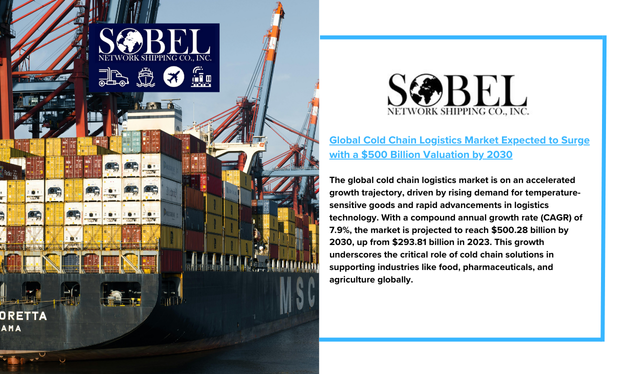Introduction: A Booming Market Poised for Expansion
The global cold chain logistics market is on an accelerated growth trajectory, driven by rising demand for temperature-sensitive goods and rapid advancements in logistics technology. With a compound annual growth rate (CAGR) of 7.9%, the market is projected to reach $500.28 billion by 2030, up from $293.81 billion in 2023. This growth underscores the critical role of cold chain solutions in supporting industries like food, pharmaceuticals, and agriculture globally.
Key Growth Drivers
Several factors contribute to the exponential growth of this market, including:
- Food and Beverage Industry Expansion: The increasing consumer demand for fresh and frozen products has placed greater reliance on efficient cold chain systems.
- Pharmaceutical Advancements: The transportation and storage of temperature-sensitive medications, including vaccines, continue to be a significant driver.
- Technological Innovations: The integration of IoT, AI, and blockchain is revolutionizing cold chain management, improving efficiency, and ensuring product integrity.
Regional Highlights and Emerging Trends
Asia-Pacific: A Hotbed for Growth
Vietnam has become a key player in Southeast Asia, with its seafood and agricultural export markets bolstering the need for advanced cold storage and logistics infrastructure. Government initiatives and foreign investments are further enhancing the country’s capabilities.
Thailand is seeing a surge in cold chain logistics, fueled by its food export industry. Technological adoption, such as IoT for real-time monitoring, has set new benchmarks in operational efficiency and sustainability.
China remains a powerhouse, with its burgeoning e-commerce sector and growing middle class driving demand for advanced cold storage solutions.
North America: Leading the Charge
The United States continues to dominate the global market, with significant investments in expanding refrigerated warehousing and transport. The integration of automation and AI has enhanced operational precision.
Europe: Focused on Sustainability
Strict food safety regulations and an emphasis on eco-friendly practices have placed Europe at the forefront of sustainable cold chain solutions. Innovations in refrigeration technologies are aligning with the region’s green goals.
Market Opportunities and Challenges
While growth prospects are immense, the market faces challenges such as high operational costs and the need for skilled workforce management. However, these are offset by opportunities in automation, real-time monitoring, and the increasing use of eco-friendly cooling technologies.
Segment Analysis
The market is segmented into key categories:
- By Product: Refrigerated warehousing and transport.
- By Application: Dairy products, seafood, frozen desserts, bakery items, fruits, vegetables, and more.
- By Temperature: Chilled and frozen solutions tailored to diverse industry needs.
A Future Driven by Innovation and Collaboration
Consolidation is becoming a prominent trend as companies seek to expand their reach and enhance capabilities through mergers and acquisitions. Simultaneously, technological advancements, such as AI-powered systems and blockchain-enabled transparency, are setting new standards for efficiency and reliability.
Conclusion: Paving the Way for a Cooler Tomorrow
The cold chain logistics market is not just a facilitator of global trade but also a key enabler of modern lifestyles. As demand for fresh and temperature-controlled goods rises, the industry’s growth reflects its indispensable role in connecting producers and consumers worldwide.
This tailored article captures the essence of market dynamics and opportunities without referencing specific companies or names. It provides a comprehensive overview while maintaining a general tone suitable for a wide audience.


